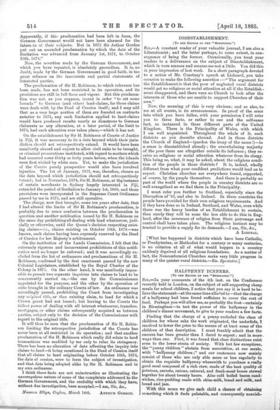DISESTABLISHMENT.
TO THE EDITOR OF THE "SPECTATOR."] SIR,—A constant reader of your valuable journal, I am also a Liberationist ; and the latter perhaps, to some extent, in consequence of being the former. Occasionally, you treat your readers to a deliverance on the subject of Disestablishment, which in turn amuses and amazes me not a little. You did this in your impression of last week. In a short paragraph devoted to a notice of Mr. Courtney's speech at Liskeard, you take occasion to make the following assertion :—" The argument for the Establishment is that the poor of neglected rural districts would get no religious or social attention at all if the Establishment disappeared, and there were no Church to look after the interests of those who are unable to support Churches of their own."
Now, the meaning of this is very obvious; and so also, to me at all events, is its erroneousness. In proof of the error into which you have fallen, with your permission I will refer you to three facts, or rather to one and the self-same fact, as instanced in three different parts of the United Kingdom. There is the Principality of Wales, with which I am well acquainted. Throughout the whole of it, such districts as you describe abound. And in those districts the Church of England—(pardon the irony of the name 1)—in a sense is disestablished already ; the overwhelming majority of the poor there are altogether outside its influence ; they receive no religions or social attention whatever from its clergy._ This being so, what, it may be asked, about the religious condition of the people in those districts ? It is, indeed, wholly different from what your confident predictions would lead us to expect. Christian churches are everywhere found, sapported, of course, by the people themselves. And there is probably no part of the world where the people in country districts are so well evangelised as we find them in the Principality.
I must refer you further to Scotland, especially since the Disruption of '43, and also to Ireland. In these countries thepeople have provided for their own religions requirements. And if they have done so in Ireland, Scotland, and Wales, even whilethere was the heavy burden of an Establishment to sustain, then surely they will be none the less able to do this in England, after the severance of religion from State patronage and control shall have taken place. The religious instinct may betrusted to provide a supply for its demands.—I am, Sir, &c., A LIBERAL.
[What has happened in districts which have been Catholic,, or Presbyterian, or Methodist for a .century or many centuries,. is no criterion at all of what would happen in a country suddenly deprived of all religions foundations. As a matter of fact, the Nonconformist Churches make very little progress in, many of the quieter rural districts.—En. Spectator.]


































 Previous page
Previous page